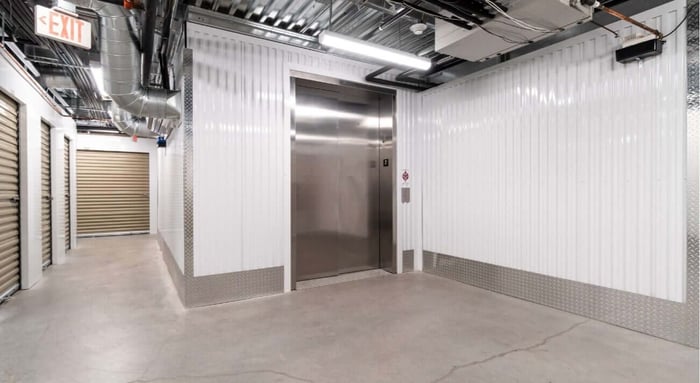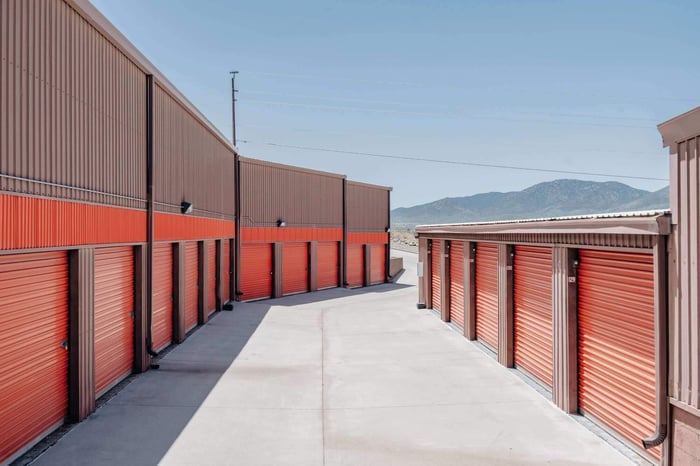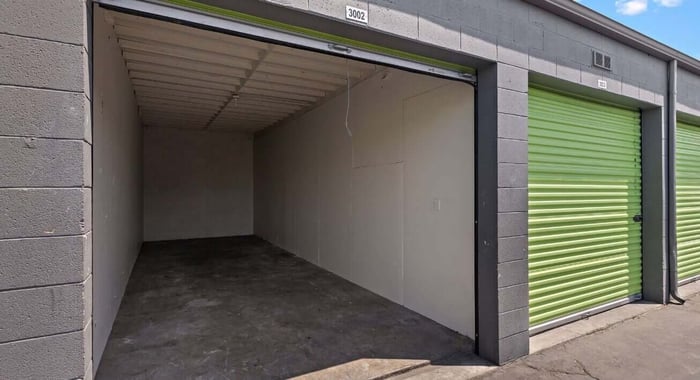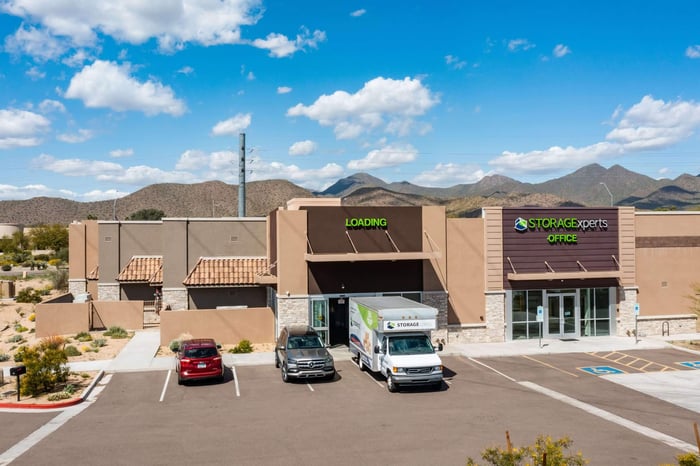Renting a storage unit can be an excellent solution when you're between homes, downsizing, or just trying to declutter your life. But while you're focused on organizing and moving your belongings, one vital question often gets overlooked: Do I need insurance for my stored items? Having the right contract and assurance in place can be a vital safeguard when it comes to your safety, peace of mind, and the value of your items. With the right resources, STORAGExperts empowers customers by providing accurate information to help them make the best decisions to protect what matters most.
At STORAGExperts, we understand how valuable your items are — financially and emotionally. That's why we want to help you understand your options for storage insurance, the potential risks involved, and how to protect your investment. We believe the best way to make informed decisions is by providing explicit content, saving you money in the long run. Through helpful links, visual aids like our icon library, and comparisons to industry leaders such as Extra Space Storage, we offer practical examples, insightful reviews, and detailed breakdowns to guide you through every step.
Understanding Storage Insurance
Let's start with the basics. Storage insurance is a type of coverage specifically designed to protect your property while stored in a storage facility. For example, it can cover storage units against risks that your condo policy does not include, clarify your rights, determine the amount and availability of coverage, and help you avoid an unexpected fee. Like renters insurance or homeowners insurance, it provides compensation in case of theft, fire, flood, or other damage. In most cases, standard insurance policies may not fully cover items stored offsite, especially in areas with higher risks like Florida or coastal states.
Many people mistakenly believe that the storage company is responsible for any damage or loss that occurs. In reality, most storage facilities — including STORAGExperts — require renters to have insurance because the facility does not take liability for stored contents. Whether you are storing items in the U.S., placing your valuable belongings in order, or storing them with the STORAGExperts logo proudly displayed, ensuring you have proper coverage to protect your items is essential.
What Could Go Wrong?
Even the best self-storage facilities are not immune to unexpected issues. Let's look at a few real-world examples that illustrate why insurance is a smart move:
1. Theft
Even with security measures such as cameras, gated access, and on-site personnel, theft can happen. An opportunistic intruder could break into multiple storage units and target valuable items like electronics, jewelry, or appliances.
2. Fire or Smoke Damage
A fire in a neighboring unit or another part of the facility can easily spread, causing irreversible damage to your stored furniture, documents, or personal items.
3. Mold and Mildew
Humidity and moisture buildup in storage units, especially in non-climate-controlled spaces, can lead to the growth of mold and mildew, ruining paper goods, clothing, and wood items.
4. Water Damage
Broken pipes, roof leaks, or flooding from severe weather can soak your belongings. Water damage is particularly devastating for electronics, photographs, and fabric-based items.
5. Natural Disasters
Hurricanes, tornadoes, or wildfires are a growing concern in many states. If your storage unit is affected, your insurance coverage can make the difference between complete replacement and total loss.
What Does Storage Insurance Cover?
Coverage varies depending on the insurance provider, policy limits, and whether the plan is part of your homeowner's insurance, a standalone storage unit insurance policy, or a third-party provider.
Generally, a good policy will cover:
- Theft or vandalism
- Fire and smoke damage
- Water damage (excluding floods, unless specified)
- Windstorms, hail, and some natural disasters
- Mold (limited coverage in many cases)
- Accidental damage during move-in or move-out
It can also extend to:
- Jewelry
- Electronics
- Furniture
- Documents
- Collectibles
- Appliances
Please read the policy details carefully to understand what is included and, more importantly, what is excluded.
What's Not Covered?
No policy covers everything. Some items or scenarios may be excluded from your insurance coverage, such as:
- Damage caused by pests (rats, termites, etc.)
- Negligence or improper storage on your part
- Items valued over policy limits
- Business-related inventory, unless specified
- Certain high-value items without proper documentation or appraisals
These exclusions vary, so it's crucial to compare contracts and discuss any uncertainties with your insurance company or a licensed agent.
Renters and Homeowners Insurance: Are Stored Items Covered?
It's a common misconception that your homeowner's or renters' insurance automatically covers everything you put in a storage unit. The truth is more complicated.
Homeowners Insurance
Many home insurance policies offer limited off-premises coverage — usually around 10% of your total policy. For instance, if your home is insured for $100,000, you may only get $10,000 in coverage for items in a storage facility.
Renters Insurance
Some renter's policies include coverage for personal property stored elsewhere, but the limits may be too low to offer complete protection.
In both cases, your insurer may deny claims about mold, mildew, or climate issues, especially if the storage unit wasn't climate-controlled.
Many storage renters opt for a dedicated storage unit insurance policy.
Cost of Storage Insurance
One of the best things about storage insurance is that it's incredibly affordable compared to the value it provides. On average:
- Basic coverage of $1,000–$3,000 costs between $8 to $15/month
- Higher-value coverage (up to $25,000 or more) may range from $20 to $40/month
- Premiums depend on state, unit type, item value, and provider
Many facilities—including STORAGExperts—offer insurance directly at the point of rental, making it easy to bundle it with your rental agreement.
Choosing the Right Policy
Selecting the right insurance policy can feel overwhelming, but it doesn't have to be. Here are steps to simplify the process:
Take Inventory
Make a detailed list of all items you plan to store. Estimate the value of each and keep receipts or photos if possible.
Check Existing Coverage
Contact your insurance agent to understand what your current home or renters policy covers.
Evaluate Risks
Consider your location, the facility's security, and the unit type. Is it climate-controlled? Is it in a flood-prone area?
Get Multiple Quotes
Compare storage unit insurance options from your storage company, third-party insurers, or your current provider.
Understand the Deductible
Just like other insurance, your policy may come with a deductible. Understand what you'll be responsible for in the event of a claim.
Common Myths About Storage Insurance
There are plenty of misconceptions floating around about storage insurance. Let's clear up some of the most common ones:
Myth 1: "My storage facility is secure, so I don't need insurance."
While STORAGExperts and other companies offer top-tier security, the best systems can't stop every incident. Insurance offers financial protection, not just physical security.
Myth 2: "My homeowner's insurance covers everything."
As mentioned, it might — but only partially. Most policies limit coverage for offsite items to 10% and often exclude certain risks like flooding or mold.
Myth 3: "I'm only storing things briefly, so insurance isn't necessary."
Disasters don't follow a schedule. Even a single week of exposure can lead to damage or loss. Most storage insurance plans offer month-to-month flexibility.
Myth 4: "It's too expensive."
Storage insurance can cost less than a cup of coffee weekly. The small premium could save you thousands in replacement costs.
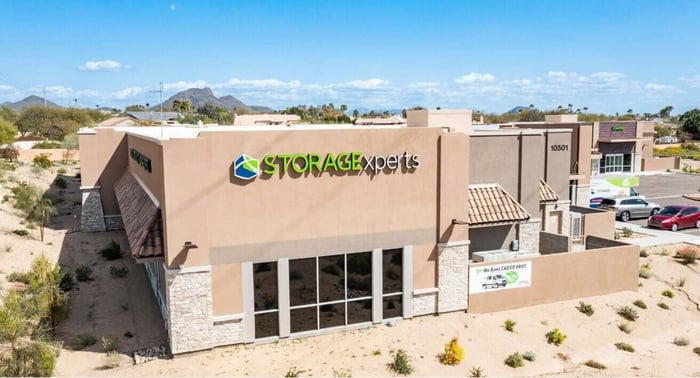
STORAGExperts in Scottsdale Arizona offers peace of mind with storage solutions that pair well with reliable insurance coverage.
Tips to Maximize Your Storage Insurance Coverage
Want to get the most from your policy? Here's how to stay protected and informed:
1. Choose a Climate-Controlled Unit
A climate-controlled storage unit is especially important for electronics, documents, or furniture. It can help prevent mildew, humidity, and extreme temperature damage.
2. Use Plastic Bins Instead of Cardboard Boxes
Plastic is more resistant to moisture, pests, and crushing. It adds a layer of physical protection to insurance.
3. Store Items Strategically
Keep high-value or sensitive items on shelves or elevated platforms. This reduces the risk of water damage from floor-level flooding.
4. Keep an Inventory
Document your stored belongings with photos, receipts, and descriptions. This will make claims easier and strengthen your proof of ownership.
5. Review Your Policy Annually
As your storage needs change, so might your coverage requirements. Make a habit of reviewing your plan once a year, especially after moving or acquiring new items.
Conclusion: Don't Risk It — Protect Your Peace of Mind
Storing your belongings shouldn't be an anxiety-provoking experience. With the right insurance coverage, you can enjoy peace of mind knowing that your valuables are protected from unexpected events. Whether you're storing furniture, jewelry, documents, or electronics, insurance is the key to safeguarding your investments.
At STORAGExperts, we're committed to helping you find the right coverage — through our plans or trusted insurance providers. We'll walk you through every step, answer your questions, and ensure you're fully covered before you lock the unit door.
Need help deciding? Contact our team today, check out our resource articles, or speak with a licensed agent. Your storage journey should be secure from start to finish.
Frequently Asked Questions
1. Can I change my storage insurance coverage once my items are stored?
Yes! Most storage insurance policies allow you to adjust your coverage at any time. You can modify your plan to suit your current needs, whether you need to add more protection or reduce your coverage after moving some items out.
2. Does storage insurance cover loss due to my negligence?
Typically, storage insurance does not cover damage caused by negligence. For instance, if you fail to pack your items or store them unsafely, the insurance might not provide compensation. Always ensure your belongings are securely packed and properly stored.
3. Can I get storage insurance if I'm storing business items?
Yes, but you need to ensure the policy covers business property. Some storage insurance policies are geared toward personal use only, so you should ask the provider about specific coverage for business-related items such as inventory or equipment.
4. What should I do if I have to claim my storage insurance?
If you need to file a claim, contact your insurance provider immediately. They will guide you through the process, which usually involves submitting photos, descriptions of the damage, and any supporting documentation like receipts or police reports, depending on the type of claim.
5. Does storage insurance cover damage caused by pests or insects?
Most storage insurance policies do not cover damage caused by pests, such as rodents, insects, or termites. However, if you suspect pest activity, consider using plastic bins and ensuring the storage unit is pest-free before storing your items.
6. How do I know if my storage unit is properly secured?
Most reputable storage facilities, including STORAGExperts, have high-security measures, such as surveillance cameras, gated access, and security personnel. However, it's a good idea to ask about the facility's security features and inspect the site to ensure peace of mind.
7. Can I store high-value items like artwork or jewelry in a storage unit?
Yes, but you should verify that your insurance coverage includes high-value items like jewelry or artwork. Many storage policies limit these valuables, so you may need to purchase additional coverage or a specialized policy.
8. Does my storage facility provide insurance automatically, or must I buy it separately?
Many storage facilities offer insurance as an add-on to your rental agreement. However, some may require you to purchase a policy before renting. You can choose from the facility's offered plan or opt for an insurance provider.
9. Is it necessary to have storage insurance if I have renters or homeowners insurance?
While renters or homeowners insurance may cover some offsite belongings, it is not always enough. Many policies offer limited coverage for items stored in a storage unit (often around 10% of your total coverage), so additional storage insurance is often recommended to protect your items fully.
10. Will storage insurance cover the full value of my belongings?
It depends on your policy limits. Most storage insurance policies have coverage limits; if your items exceed those limits, you may need to purchase additional coverage. Continually assess the total value of your belongings and choose a policy that adequately covers that amount.
